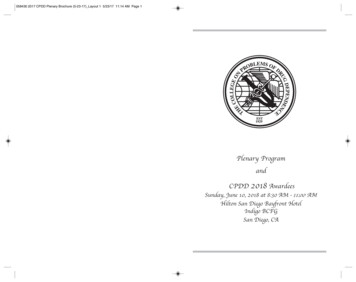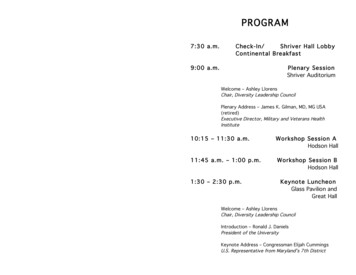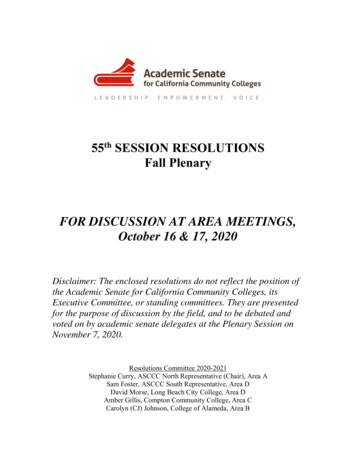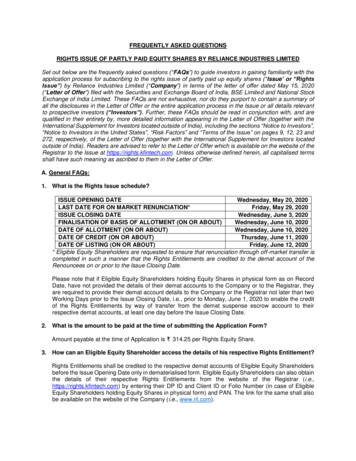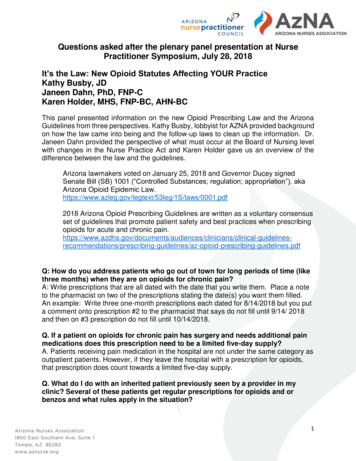
Transcription
Questions asked after the plenary panel presentation at NursePractitioner Symposium, July 28, 2018It’s the Law: New Opioid Statutes Affecting YOUR PracticeKathy Busby, JDJaneen Dahn, PhD, FNP-CKaren Holder, MHS, FNP-BC, AHN-BCThis panel presented information on the new Opioid Prescribing Law and the ArizonaGuidelines from three perspectives. Kathy Busby, lobbyist for AZNA provided backgroundon how the law came into being and the follow-up laws to clean up the information. Dr.Janeen Dahn provided the perspective of what must occur at the Board of Nursing levelwith changes in the Nurse Practice Act and Karen Holder gave us an overview of thedifference between the law and the guidelines.Arizona lawmakers voted on January 25, 2018 and Governor Ducey signedSenate Bill (SB) 1001 (“Controlled Substances; regulation; appropriation”), akaArizona Opioid Epidemic 01.pdf2018 Arizona Opioid Prescribing Guidelines are written as a voluntary consensusset of guidelines that promote patient safety and best practices when prescribingopioids for acute and chronic dfQ: How do you address patients who go out of town for long periods of time (likethree months) when they are on opioids for chronic pain?A: Write prescriptions that are all dated with the date that you write them. Place a noteto the pharmacist on two of the prescriptions stating the date(s) you want them filled.An example: Write three one-month prescriptions each dated for 8/14/2018 but you puta comment onto prescription #2 to the pharmacist that says do not fill until 9/14/ 2018and then on #3 prescription do not fill until 10/14/2018.Q. If a patient on opioids for chronic pain has surgery and needs additional painmedications does this prescription need to be a limited five-day supply?A. Patients receiving pain medication in the hospital are not under the same category asoutpatient patients. However, if they leave the hospital with a prescription for opioids,that prescription does count towards a limited five-day supply.Q. What do I do with an inherited patient previously seen by a provider in myclinic? Several of these patients get regular prescriptions for opioids and orbenzos and what rules apply in the situation?1
A. This is case specific, but nurse practitioners are responsible for all scripts they write.The Arizona Opioid Guidelines have an appendix addressing this situation. Itaddresses tapering patients, referring them to other agencies and/or adding adjuncttherapies such as Physical s.pdfQ. What if patients are driving themselves to their own pain appointments onopioids - are we liable for not reporting or giving them prescriptions?A. This is not identified in the law nor is this specifically identified in the guidelines.However, it should be addressed in pain agreements. Just because a patient takes acontrolled medication does not mean they are impaired. See also 2017 AdvisoryOpinion from AZBON: tances-forthe-treatment-of-chronic-pain.pdfQ. If you inherit a patient on Suboxone, who was managed by the previousprovider, what is the nurse practitioner’s responsibility as the new provider?A. You can assist the patient in finding a provider who has the waiver to prescribeSuboxone. Unless you have successfully completed the training and received thewaiver (“X” Designation) to prescribe Medically Assisted Treatment, you cannotprescribe Suboxone.Q. In providing care for elderly patients who are not self-administering theirprescribed long-term opioids or benzodiazepines is there any waiver orexemption for those patients who are in assisted-living facilities.A. Assisted living facilities are not specifically mentioned in the new law or in the AZguidelines. Skilled nursing facilities & hospitals are cited as exemptions in the law.Q. Are NPs who provide pain management represented on any policy or statecommittees?A. Karen Holder, FNP has been representing nurse practitioners and advancedpractice nurses, on behalf of AZNPC, as a member of the Arizona Department of HealthServices (ADHS) Clinical Advisory Team on Opioid Use & Misuse. The team wasestablished in 2015 by ADHS, with invited providers & leaders from various specialtieswho represent their colleagues and constituents. Additionally, AZNA has weighed insuccessfully with the legislature, the Governor’s office and ADHS prior to and during thepassage of the legislation as well as in subsequent follow up legislation and rulemakingresulting in changes favorable to NPs and other advance practice nurses.Q. When are NPs going to be able to prescribe marijuana?A. Marijuana is a Schedule I Substance and no one can prescribe Schedule Imedications, including marijuana in the state of Arizona. It is against federal law to doso. There are physician providers who can certify patients for a medical marijuana card.The Arizona Medical Marijuana Act (ARS 36-2801 et seq.) was passed by the votersand included the limitation to physician certification and because it was an initiative it isvoter protected and thus a simple majority of the legislature cannot amend the statutes.2
Not only has it been impossible to date for any “pro-marijuana” legislation (includingexpansion of certifiers as well as recreational use) but it is very unlikely because of thesuper majority requirements to amend this initiative by the legislature in light of thecurrent political environment.Q. Do we need to keep a printed copy of the prescription monitoring programreport in the patient’s chart?A. No you do not have to have a printed copy in the chart. By law, you do need todocument that you reviewed the CSPMP report for any aberrant or inappropriateprescribing relating to the patient before you refill or prescribe a Schedule II or III opioidor a benzodiazepine.Q. Are there specific requirements that need to be met to prescribe Suboxone foropiate use disorder or ETOH disorder use?A. Yes, to prescribe Suboxone for OUD you must have a federal waiver in order toprescribe. For further information qualify-np-pawaiversQ. Is CBD oil okay with the use of Opioids?A. This is not addressed in the law or the guidelinesQ. Does the board have a position or any guidance on patients who have startedor would like to start medical marijuana use?A. The board does not have an advisory opinion on the subject.Q. Can nurse practitioners prescribed methadone without a physician signingoff?A. A nurse practitioner can prescribe methadone for pain and only pain. An NP cannotprescribe methadone for substance/opioid use disorder. Remember, in the state ofArizona a NP can only work within his/her scope of practice, even if a physician agreesto sign off on a prescription or plan of care. Arizona NPs practice independently fromphysicians. It is YOUR license on the line.Q. How does or will this impact federal facilities like VA hospitals?A. Federal facilities fall under federal law, not state laws. It is very important for nursepractitioners functioning in federal facilities to clearly understand what federal lawallows.Q. When a prescription for five days is written if it is once daily for up to fourtimes daily or 1 to 2 tabs per dose, does that make a difference?A. The five-day rule is relevant to whatever the dose or frequency is written on theprescription. For example, a patient could receive a prescription for 2 tabs Q 4hours#60, or a prescription for 1 tab every 8 hours #15.3
Q. If the patient is being seen in the pain clinic how long can the patient be on anopioid?A. The law sets limits on new prescriptions and on prescriptions for opioid naïvepatients. Patients on long term opioids and/or those followed in specialty painmanagement clinics are not restricted to the same limits as new or opioid naive patients.Related to CE hour requirementQ. When you renew your RN license do you have to have three hours of opioideducation?A. Yes, there is a requirement for three hours of opioid education due at the time yourenew your RN license/AP certificate.Q Are there any specific national CE requirements that mandate opioid educationfor certification or recertification?A. At this point in time, there is no national mandate to require opioid CE by either of theNP certification bodies (AANP & ANCC). However, if audited by the Arizona Board ofNursing, your CE would need to be from a nationally accredited program. Programcontent does not have to be specific to prescribers but must be related to painmanagement and opioids.Q. From the Arizona Board of Nursing perspective with the opioid prescribing of5/30 rule is it acceptable to write two prescriptions - one for five days and thesecond for 25 days - or does there need to be a follow-up office visit after the fivedays.A. The law is designed so that patients would receive a five-day prescription and bereevaluated to determine if they needed further pain medication. The majority ofpatients do not need more than five days of opioid medication. The panelists wereunsure what the 5/30 rule is but expect that it is referring to the 5-day for an initialprescription of opioids.Q. There have been concerns about using the Opioid Assistance and ReferralCenter (OAR line) for consults. The people answering the call may not bequalified to answer your questions.A. The OAR director, Daniel Brooks, MD recommends: “When you call the OAR line,you will most often get and RN or Pharmacist. If the RN or Pharmacist is not able toanswer your question, you need to ask to speak with a physician. One of their on-callphysicians will get back to you if they are not immediately available. In correspondencewith Dr. Brooks, he writes: “We look forward to providing assistance with any/all opioidrelated issues, including high- dose prescribing. Please remind your colleagues that ourstaff (certified pharmacists, RNs, PharmDs and physicians) are available 24/7. Thisincludes consults, when needed, with our physician Toxicologists for more complicatedcases.” The OAR line webpage is http://azpoison.com/news/arizona-oar-line4
Q. Where does the intrathecal opioid dose calculations apply or how does it comein with orals?A. The law does not address dosing for intrathecal devices.Q. What do you do if you suspect a colleague is misusing a controlledsubstance?A. Refer the nurse to the Board of Nursing’s Alternative to Discipline (ATD) page on thewebsite and file a complaint with the Board of Nursing. If the nurse is eligible for theATD program they will get the treatment needed and as long as they are complaint withthe agreement, they will not receive discipline on their license. Remember it is aviolation of the Nurse Practice Act to not report a nurse who you believe to be impairedand working with patients or the public.Q. I know we are supposed to use nonpharmacologic treatments, but how do wedeal with the cost (example Flector patch, compounded gels and creams,acupuncture) that insurances won’t cover?A. Legislative involvement, Alternative treatments such as: massage, physical therapy,acupuncture, aroma therapy, visualization, etc.Q. How might the board regulate or view a complaint from a patient who isn’tgetting better pain addressed?A. Every complaint is looked at on a case by case situation. The Board will reviewinformation to determine if the NP followed the standard of care and if there were anyviolations of the Nurse Practice Act.Q. Is tramadol one of the opioid agonists that are allowed beyond five dayswithout a new prescription in opioid naïve patients?A. The Drug Enforcement Administration (DEA) officially scheduled tramadol as aSchedule IV substance within the U.S. under the Controlled Substance Act on August18, 2015. Schedule IV drugs, with the exception of benzodiazepines, are not addressedin the new law. However, tramadol is a scheduled drug, an opioid agonist and ispotentially addictive.Q. Does the use of tools such as: SOAPP-R, COMM, ORT, audit – C, DUST, andcage– AID qualify for screening for OUD as required?A. No. “The screening tools listed above are not designed to screen for opioid disorderand their sensitivity is low. Providers should seek to identify evidence of opioid usedisorder, rather than relying on screening tests with low sensitivity.” For furtherguidance, see page 22 of the Arizona opioid ines.pdf5
A nurse practitioner can prescribe methadone for pain and only pain. An NP cannot prescribe methadone for substance/opioid use disorder. Remember, in the state of Arizona a NP can only work within his/her scope of practice, even if a physician agrees to sign off on a prescription or plan of care. Arizona NPs practice independently from





